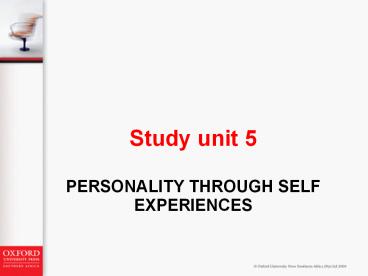Study unit 5 PERSONALITY THROUGH SELF EXPERIENCES * * What - PowerPoint PPT Presentation
1 / 14
Title:
Study unit 5 PERSONALITY THROUGH SELF EXPERIENCES * * What
Description:
Study unit 5 PERSONALITY THROUGH SELF EXPERIENCES * * What are the main contributions of humanism and why is it important in psychology? Identify and describe themes ... – PowerPoint PPT presentation
Number of Views:68
Avg rating:3.0/5.0
Title: Study unit 5 PERSONALITY THROUGH SELF EXPERIENCES * * What
1
PERSONALITY THROUGH SELF EXPERIENCEs
- Study unit 5
2
- What are the main contributions of humanism and
why is it important in psychology? - Identify and describe themes of humanist
psychology - Name and discuss the main assumptions of humanism
- Define self concept
- Describe the development of self
- Discuss the motivation factors in becoming a
person - Describe the optimality and deficiencies in being.
3
Background to humanistic view
- Views being a person or having a sense of self as
a continual rational process - Each person has their own perception of reality
- Uniqueness of each persons context
- Also called the third force
- View personality from an optimistic point of view
compared to Freuds determinism and behaviourism - Humanists are a reaction to existentialisms
emphasis on despair in life - Made up of various theories
- Main concern is that people are seen as
intrinsically good - Reality seen as how each person exist in the
here and now.
4
Main assumptions of humanistic approach
- Subjective or phenomenological experiences
- How people subjectively interpret events and
phenomena - Uniqueness of each individual
- Peoples experience is unique as well as
subjective - Personality as a Gestalt or holistic phenomenon
- Consider the person as a whole or in totality
- Intrinsic goodness, potential and
self-actualisation of people - Belief in peoples intrinsic ability to grow
toward healthy adjustment - Free will or self determination
- People have the ability to be in control on what
happen in their lives.
5
Self-concept The integrating personality
structure
- Rogers self or ego psychologist
- Concept of self central
- Comprises three premises
- Phenomenological field
- Represents all experiences, perceptions and
meanings attached to objects or events outside
the person - The organism
- Refers to the total psychophysical individual or
person - The self
- Refers to individuals perceptions of themselves
as a result of their phenomenological field.
6
Rogers theory the three premises
7
Terminology of the self-concept
- Self concept consistency or patterned
experiential knowledge of the self - Self-monitoring
- Self-verification and self-enhancement
- Self-awareness, self-schemas, self-identity
- Self-esteem or self assessment
- Self-efficacy
- Conviction that one can successfully engage in
productive behaviour - Constructs
- Cognitive self-representation which people use to
define social and interpersonal relationships - Constructive alternative
- Meaning of things can always change.
8
Different meanings of the self-concept
9
Development and maintenance of self
- The ongoing process of self-concept formation and
development centres on the physical, intellectual
and psychosocial spheres of human behaviour. - Kellys construct systems (meaning system)
- Rogers theory
- Postulates have an inherent capacity for growth
towards self-actualisation - Organismic survival values
- Positive regard
- Unconditional self regard
- Conditional self regard.
10
Motivational forces in becoming a person
- Finding meaning in life
- Will to meaning/self-transcendence
- Frankls creative, experiential and attitude
values - Needs and self actualisation
- Maslows self-esteem and actualisers
- Rogers self actualisation
- Transcendent self actualisers
- Peak experiences
- Job-characteristics model
- Free will as perceived self-control
- Freedom of choice and the sense of being in
control - Learned helplessness and self-handicapping
behaviours - Fears of success and failure.
11
Experiencing work meaningfully
12
Maladjustment, adjustment and optimality
Negative
Average
Positive
Normal Healthy
Optimal Actualised
Abnormal Maladjustment unhealthy
13
Terminology of humanistic approach
- Fully functioning person
- Optimality
- The congruency of self-perception and experience
- Perceptual distortion
- Positive thinking
- Pathogenic
- Resilience
- Salutogenetic paradigm
- Fortigenesis
- Alienation
- Rogers client centred therapy.
14
Thank you.































